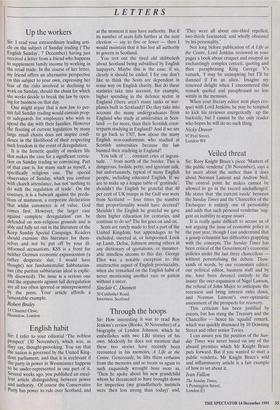English habit
Sir: I refer to your editorial 'The noblest prospect' (30 November), which was, as they say, thought-provoking. You say that the nation is governed by the United King- dom parliament, and that it is irrelevant if the party in power in Westminster happens to be under-represented in one part of it. Several weeks ago, you published an excel- lent article distinguishing between power and authority. Of course the Conservative Party has power to rule over Scotland, and
at the moment it may have authority. But if its number of seats falls further at the next election — say to five or fewer — then I would maintain that it has lost all authority to govern in Scotland.
You trot out the tired old shibboleth about Scotland being subsidised by English taxpayers. Maybe this is the case; if so, clearly it should be ended. I for one don't like to think the Scots are dependent in some way on English charity. But do these statistics take into account, for example, higher spending in the defence sector in England (there aren't many tanks or war- planes built in Scotland)? Do they take into account the many undergraduates from England who study at universities in Scot- land — far more, than their Scottish coun- terparts studying in England? And if we are to go back to 1707, how about the many English non-conformists who studied at Scottish universities because the law banned their studying in England?
You talk of `. .. constant cries of ingrati- tude. . .' from north of the border. This is dangerous, foolish, petty, and ignorant talk, but unfortunately, typical of many English people, including educated English. If we are to make up a league table of 'gratitude', shouldn't the English be grateful that 40 per cent of UK troops in the Gulf war were from Scotland — four times the number that proportionality would have decreed? Shouldn't the English be grateful we gave them higher education for centuries, and continue to do so? The list goes on and on.
Scots are rarely made to feel a part of the United Kingdom, but appendages to be excluded, sneered at, or lampooned. Look up Lamb, Defoe, Johnson among others in any dictionary of quotations, or innumer- able mindless sitcoms to this day. George Eliot was a notable exception to this unattractive aspect of English provinciality, when she remarked on the English habit of never mentioning another race or nation without a sneer.
Sinclair C. Dunnett
30 Culduthel Road, Inverness, Scotland


































































 Previous page
Previous page